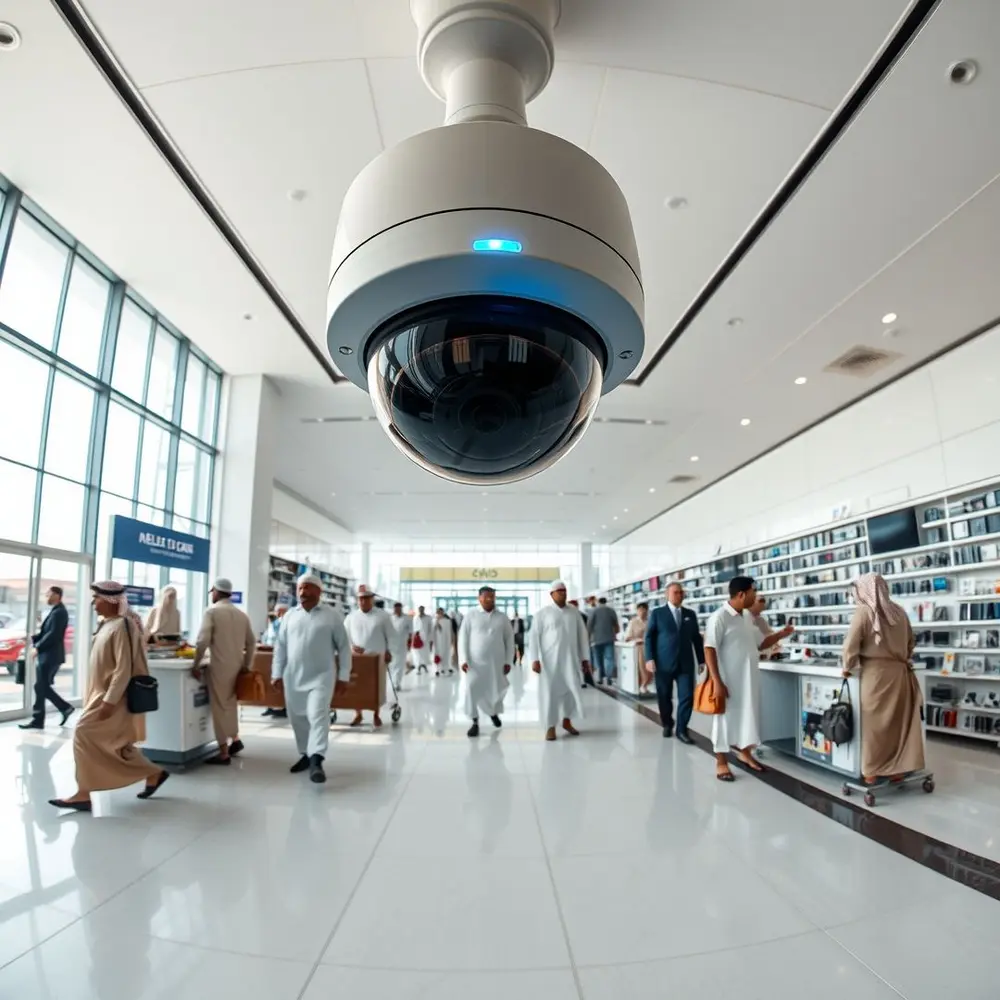Top 10 Uses of IP Cameras in Oman’s Retail Industry

Top 10 Uses of IP Cameras in Oman’s Retail Industry
The retail landscape in Oman is undergoing a remarkable transformation, driven by technological innovation and escalating consumer expectations. Amid this evolution, Internet Protocol (IP) cameras have become indispensable tools, advancing far beyond simple surveillance devices to become versatile assets driving security, operational intelligence, and customer engagement. These networked digital cameras offer unmatched image clarity, remote accessibility, and advanced analytic capabilities—qualities perfectly suited to Oman’s dynamic retail sector. As retailers across Muscat, Salalah, Sohar, and beyond strive to protect assets, optimize service, and streamline operations, understanding the multifaceted applications of IP security systems becomes crucial. This article explores ten strategic ways Oman’s retail industry leverages IP cameras to confront challenges and unlock new growth opportunities in an increasingly competitive market.
Preventing Shoplifting and External Theft
For retailers in Oman, mitigating inventory shrinkage due to shoplifting is a top priority. IP cameras offer a potent deterrent and investigative solution with high-definition video feeds delivering crucial evidence. Positioned over entrances, checkout lanes, high-value merchandise zones, and blind spots, these cameras capture detailed facial features, clothing, and incident timelines. Modern systems integrate with point-of-sale terminals (POS), triggering alerts during suspicious behaviors like crowds lingering near electronics countertops or bag concealment—common theft tactics encountered in Omani malls and hypermarkets. When incidents occur, exported video fragments facilitate swift cooperation with Royal Oman Police, increasing chances of apprehension such as a case involving Dh100,000 (£20k) recovered jewelry in Seeb after chain-store employees used timestamped footage to track culprits efficiently. A reliable surveillance infrastructure distinguishes between minor losses and damaging financial impacts.
Monitoring Staff Activities
Human resource management is streamlined using IP surveillance, reducing opportunities for internal shrinkage which often surpasses external losses in Oman’s retail sector. Cameras at cash points discourage and record till tampering, improper discounts, or “sweetheart deals” offered illegally to acquaintances. Warehouse/storage monitoring logs stock movements, crucial given Oman’s requirements for oversized stores to warehouse diverse inventories including luxury imports demanding climate controls. Beyond security, synchronized video audits track employee attendance compliance amidst Oman’s fluctuating seasonal footfall rates. Ethical implementation—emphasizing security transparency through visible signage per Omani labour laws—builds trust while protecting seamless multinational operations.
Enhancing Customer Experience
Knowing customer behaviour unlocks service excellence; IP cameras enable Qatar Optical outlet managers to observe in-store traffic flow bottlenecks slowing purchases while identifying peak engagement hotspots needing increased staff allocation—a must-have understanding during Ramadan and Eid surges overwhelming traditional department layouts. Queue-counters integrated with cameras reduce perceived wait times by adjusting manned lanes dynamically. Heat-mapping reflects lingering durations around high-margin products, giving chains like Lulu Hypermarket Oman opportunities to reconfigure displays, improving Saudi/Kuwaiti tourist purchases which surged 12% after Sultan Qaboos Port’s cruise expansions. Comfortable retail environments reinforced via responsive technology drive loyalty post-pandemic recovery.
Optimizing Store Layouts/Merchandising
Brick-and-mortar efficiencies benefit greatly from visual analytics alongside isolated sales statistics. IP cameras deployed throughout outlet floors quantify shopper journeys: Average dwell times pinpoint engaging categories needing duplication; linger zones demonstrate optimal positioning for new product launches or promotional drives; dead areas trigger redesign strategies preventing rent wastage—especially critical within premium Muscat Grand Mall or Mall of Oman spaces. Luxe boutiques utilize people-counting to arrange high-contact accessory placement near changing rooms, enhancing impulse buying. Such breakdowns helped Omani fashion franchise operators trim redundancies by 8% while lifting conversion rates through strategic fixtures mapping guided purely by observational metrics.
Enforcing Health and Safety Regulations
Upholding occupational safety standards in warehouses, storage areas, and sales floors becomes manageable with IP camera vigilance protecting employees from cumulative risks—slips due to improperly stacked cartons or machinery operations without protective gears. Real-time footage enables prompt response minimizing injury severities across stocks ranging from heavy furniture imports to electronics. Post-pandemic, ensuring mask compliance and crowd-capacity limitations required systematic oversight achievable via AI-integrated facial recognition and automated counting—measures rapidly embraced among several Oman company solution partners including commercial security providers catering specifically toward improved enterprise wellness.
Remote Management of Multiple Branches
Centralized oversight across Oman’s geographically scattered network is indispensable for nationals expanding regionally like powerhouses Saisan Group Holdings or Oman Oil Marketing Company. Administrators overseeing stores in Sur, Nizwa, Muharraq, and Salalah leverage IP cameras providing unified visibility across sites without costly travels. High-bandwidth PoE installations ensure perpetual data streams displaying live inventory selections, observing staff rosters performances, verifying premises lighting post-closures, and validating delivery trucks adhering to schedules and quality protocols—controls simplifying statewide operations significantly.
Integrated Access Control Systems
Combining IP-based cameras with intelligent electronic locks forms a holistic defence strategy against restricted zone infiltrations—server rooms holding sensitive consumer data, pre-launch stock inventories, staff offices containing payrolls. Facial/biometric recognition grants conditional permissions to authorized personnel while triggering instant capture snapshots when alarms are activated. This prevents scenarios like duplicate keys circulating loosely or unauthorised staff accessing perfume/cosmetics vaults in upscale department chains—integrated solutions increasingly deployed through unified security installations tailored for prestigious retail hubs.
Strengthening Supply Chain Security
Retail backend integrity demands rigorous supervision across loading bays, docks, and distribution centres vulnerable to goods pilferage during cross-border transit. Waterproof vandal-resistant IP cameras installed alongside Oman’s busy Sohar Port corridors track serialized pallet movements remotely while audio-intercom functions enable operational communications reducing discrepancies. Tamper-detection triggers notifications should containers undergo unexpected openings en route mitigating disappearance incidents whose overall financial impacts among Gulf supply chains total ~$15 Billion annually—placing preventative camera strategies as essential defense.
Marketing Analysis and Consumer Demographics
Retail smart-cameras capture insights surpassing observational studies. Advanced analytical software processes feed data offline identifying demographic cohorts frequenting certain corners based on appearance indicators (ethnicity estimates, approximated age brackets, travel group sightings). Tracking promotional displays’ effectiveness objectively through number-of-stops frequency provides competitive edges: Omani bookstore chains shifted youth-targeted collections similarly positioned historically near adult fiction sections, yielding 5% enhanced revenue sharing within test locations after analytics guided refinements enabling personalized promotions maximizing each customer segment engagement.
Upholding Regulatory Compliance
Regulatory authorities in Oman stipulate industry-specific mandates ranging from tracking data storage durations to safeguarding customer information reliably. Restaurants/bars must guarantee minors aren’t served alcohol; weapon outlets require heightened verification protocols capturing identification checkpoints with utmost clarity. IP cameras deliver audit-compliant evidence satisfying Royal Oman Police guidelines reliably while preserving files systematically encrypted against leaks. Backed by cloud storage solutions incorporated into modern setups such as those by leading Omani system integrator easytechno, retailers achieve consistent compliance without administrative overheads.
IP cameras have emerged as transformative instruments across Oman’s prospering retail sector—securing tangible assets, refining operational productivity, deepening consumer understanding, and streamlining multi-chain supervision. Beyond deterring criminals, they illuminate shopper patterns guiding merchandising strategies and workforce optimizations unmatched by conventional metrics. As artificial intelligence analytics advance and integration capacities broaden through intuitive platforms like those provided by security-specialized firms, the applicability of IP surveillance expands exponentially. Omani retailers investing strategically in robust, future-ready systems like these stand uniquely positioned to navigate market complexities while elevating service benchmarks converging global retail excellence standards regionally.
